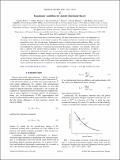Koopmans' condition for density-functional theory
Author(s)
Dabo, Ismaila; Ferretti, Andrea; Poilvert, Nicolas; Li, Yanli; Marzari, Nicola
DownloadDabo-2010-Koopmans' condition.pdf (544.5Kb)
PUBLISHER_POLICY
Publisher Policy
Article is made available in accordance with the publisher's policy and may be subject to US copyright law. Please refer to the publisher's site for terms of use.
Terms of use
Metadata
Show full item recordAbstract
In approximate Kohn-Sham density-functional theory, self-interaction manifests itself as the dependence of the energy of an orbital on its fractional occupation. This unphysical behavior translates into qualitative and quantitative errors that pervade many fundamental aspects of density-functional predictions. Here, we first examine self-interaction in terms of the discrepancy between total and partial electron removal energies, and then highlight the importance of imposing the generalized Koopmans’ condition—that identifies orbital energies as opposite total electron removal energies—to resolve this discrepancy. In the process, we derive a correction to approximate functionals that, in the frozen-orbital approximation, eliminates the unphysical occupation dependence of orbital energies up to the third order in the single-particle densities. This non-Koopmans correction brings physical meaning to single-particle energies; when applied to common local or semilocal density functionals it provides results that are in excellent agreement with experimental data—with an accuracy comparable to that of GW many-body perturbation theory—while providing an explicit total energy functional that preserves or improves on the description of established structural properties.
Date issued
2010-09Department
Massachusetts Institute of Technology. Department of Materials Science and EngineeringJournal
Physical Review B
Publisher
American Physical Society
Citation
Dabo, Ismaila. et al. "Koopmans’ condition for density-functional theory." Physical Review B 82.11 (2010): 115121. © 2010 The American Physical Society
Version: Final published version
ISSN
1550-235x
1098-0121